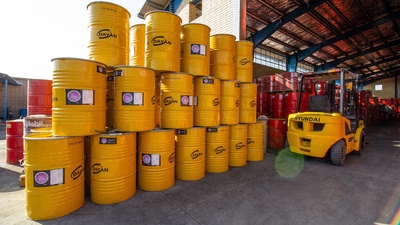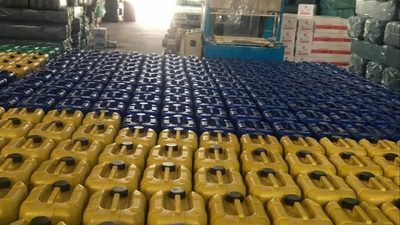
Base oil production in West Asia: key players and insights.
West Asia, also known as the Middle East, is a major producer of base oils. The region possesses significant crude oil reserves, making it a key player in the global oil and gas industry. Several countries in West Asia have established petroleum refining infrastructure, enabling them to produce base oils. Saudi Arabia is one of the largest producers of base oils in West Asia. The country has a well-developed refining sector and possesses significant crude oil reserves. Saudi Aramco, the state-owned oil company, operates several refineries that produce base oils of various grades.
The UAE is another prominent base oil producer in the Middle East. The country has invested heavily in refining infrastructure and has established refineries capable of producing high-quality base oils. Companies like Abu Dhabi National Oil Company (ADNOC) and Emirates National Oil Company (ENOC) are key players in the production of base oils in the UAE. Iran has a long history of oil production and refining. The country operates several refineries that produce base oils to meet domestic demand and for export purposes. National Iranian Oil Company (NIOC) and its subsidiaries are involved in base oil production in Iran.
These countries, along with other nations in West Asia, contribute to the production of base oils, ensuring a steady supply to meet regional and global demand. The strategic location, abundant crude oil reserves, and investments in refining infrastructure have positioned West Asia as a significant base oil producer in the global market.
The production of base oils in the Middle East under international certifications such as ISO 9001, ISO T / S 16969, OHSAS 18001, ISO T / S 29001 and ISO 14001 as well as ISO / IEC 17025 has a production of several million tons per year. Industrial oils, gasoline, diesel, automotive gear oils, motorcycle oils, special and marine engine oils, greases, base products (slack wax, paraffin, extracts and base oils SOC-500), antifreeze - anti-boiling are among our products.
For non-professional motor oil production, mixing several materials with certain percentages in a mixing unit is considered, but the fact is that the process of this growing industry is more complex than that mentioned above. Modification of old standards as needed, with the development of new and appropriate standards to reduce friction and corrosion and optimize fuel consumption of new engines, require excellent formulations and raw materials.
Raw materials play a very decisive role in the production of engine oil, although about 80% by volume of each engine oil is the base oil from the initial process. One of the types of base oils is mineral oils. The base oil obtained from the refining of crude oil cutting (lobe cut) alone does not provide lubrication properties in engine oil and various additives play a decisive role in optimizing the required factors. Engine oil produced with high quality mineral and synthetic base oil and its enrichment with additives produced by reputable companies in the world can be considered a suitable reference for relative comparison of the quality of different engine oil products in standard units.
Kuwait is known for its substantial oil reserves and refining capabilities. The country has refineries that produce base oils to cater to both domestic and international markets. Kuwait Petroleum Corporation (KPC) is the state-owned entity responsible for oil production and refining in Kuwait. Qatar has emerged as a significant player in the oil and gas industry. The country has invested in expanding its refining capacity, including base oil production. Qatar Petroleum oversees the oil and gas operations in the country, including base oil production. Oman has refining facilities that produce base oils, primarily for domestic consumption and regional export. Oman Oil Refineries and Petroleum Industries Company (ORPIC) is responsible for refining operations in the country.
-

Base oil is primarily consumed by the lubricant industry, which includes automotive, industrial, marine, and aviation sectors. Its demand is closely linked to lubricant consumption, driven by factors such as industrial growth, vehicle sales, and machinery maintenance. The automotive sector significantly influences base oil demand due to the number of vehicles on the road and their maintenance needs. Industrial activities like manufacturing and construction also rely heavily on lubricants derived from base oil. Base oil is produced through refining crude oil or chemical synthesis and serves as a key raw material for engine oils and industrial lubricants. The production process involves heating crude oil to separate lighter hydrocarbons for fuels while heavier ones are refined into base oils. Additives are incorporated to enhance properties like friction resistance and cleaning capabilities. Market trends indicate a growing shift towards high-performance and environmentally friendly lubricants, affecting specific base oil grades" demand.
Regional variations in industrial activity and economic development influence base oil consumption patterns, with emerging economies experiencing increased demand due to rapid urbanization. Additionally, recycling processes for used lubricants are gaining traction, providing sustainable alternatives that may impact virgin base oil demand. "
-

Base oil is a crucial component in the formulation of lubricants, primarily derived from refined petroleum. It constitutes over 95% of most lubricants, including motor oils and hydraulic fluids. The refining process yields base oils with desirable properties such as high viscosity index, thermal stability, and oxidation resistance, which are essential for reducing friction and protecting machinery. Base oils can be categorized into five groups by the American Petroleum Institute (API), ranging from less refined to specialty oils. While most base oils are petroleum-based, synthetic alternatives like polyalphaolefins and esters are gaining popularity due to their superior performance in extreme conditions. The increasing reliance on base oil in lubricant efficiency highlights its significance in the industry.
-

West Asia, particularly the Middle East, is a crucial hub for base oil production due to its vast crude oil reserves and advanced refining infrastructure. Saudi Arabia leads the region with its extensive refining capabilities, primarily through Saudi Aramco, which produces various grades of base oils. The UAE follows closely, with significant contributions from ADNOC and ENOC, focusing on high-quality base oils. Iran also plays a vital role in this sector, leveraging its historical oil production and refining expertise through the National Iranian Oil Company (NIOC). Other countries like Kuwait, Qatar, and Oman are also notable producers, each with their own state-owned entities managing oil production and refining. The region"s strategic location and investments in modern refining technologies ensure a steady supply of base oils to meet both regional and global demands. Base oils produced in West Asia adhere to international certifications such as ISO 9001 and ISO 14001, ensuring quality standards are met. The complexity of producing engine oils involves not just base oils but also various additives that enhance lubrication properties.
As the industry evolves, new standards are being developed to optimize fuel efficiency and reduce engine wear. "
-

Base oils have a rich history dating back to ancient civilizations, where lubricants were derived from animal fats and vegetable oils. The modern era of base oils began in the 19th century with the rise of the petroleum industry, driven by significant oil discoveries and advancements in refining techniques. Initially, crude oil-based lubricants were not favored due to their inferior performance compared to animal-based options. However, as automobile demand surged, manufacturers began optimizing crude oil processing to produce better lubricants. By the early 20th century, engine oils were classified by viscosity, leading to a focus on refining for improved efficiency. The American Petroleum Institute established a classification system for base oils based on refining methods and properties. Over time, innovations such as solvent extraction and hydroprocessing enhanced base oil quality. The introduction of synthetic base oils in the mid-20th century marked a pivotal shift in lubricant technology, offering superior performance for various applications including automotive and industrial uses. Today, ongoing research aims to develop environmentally sustainable base oils that meet modern engine requirements.




